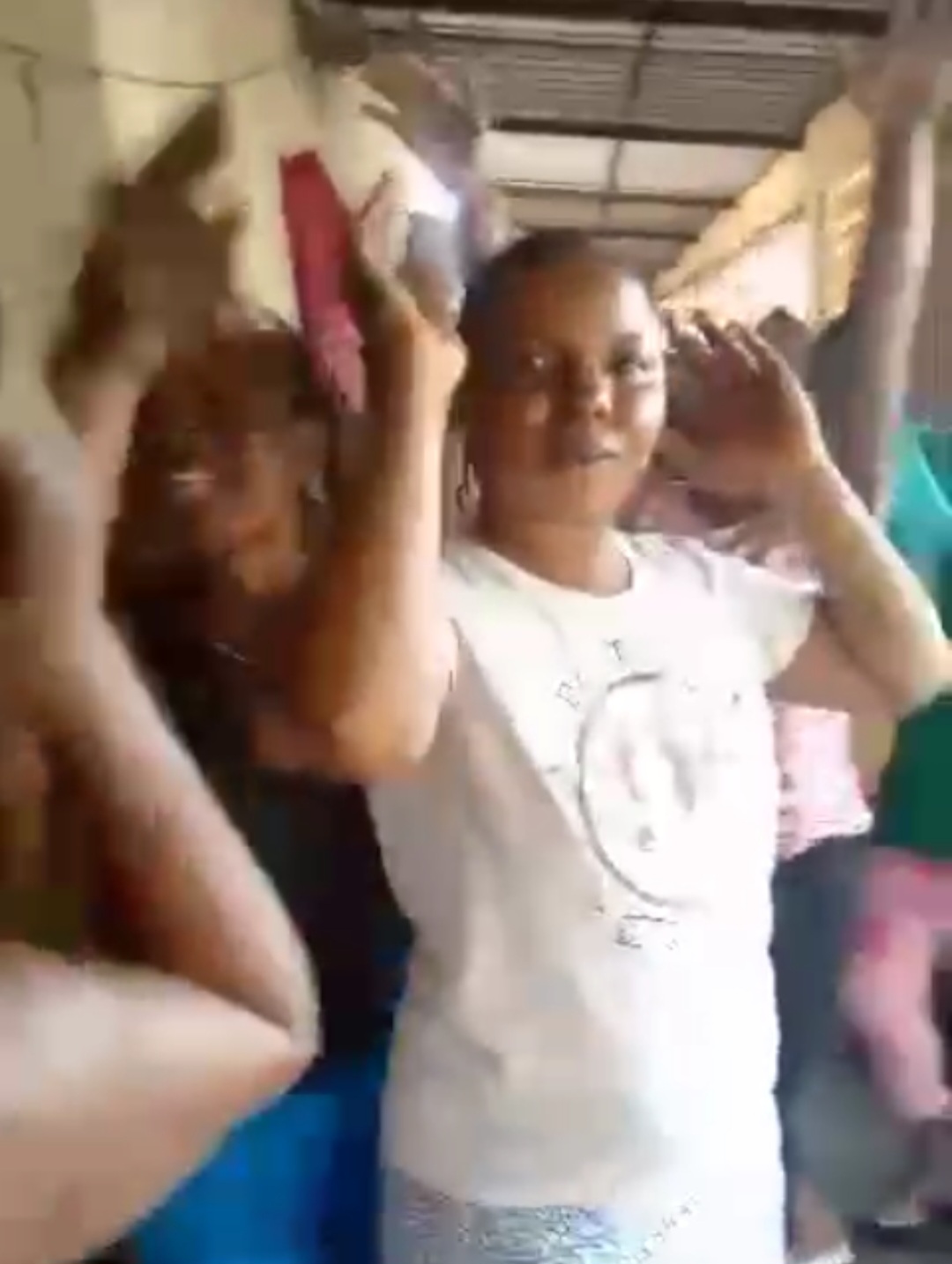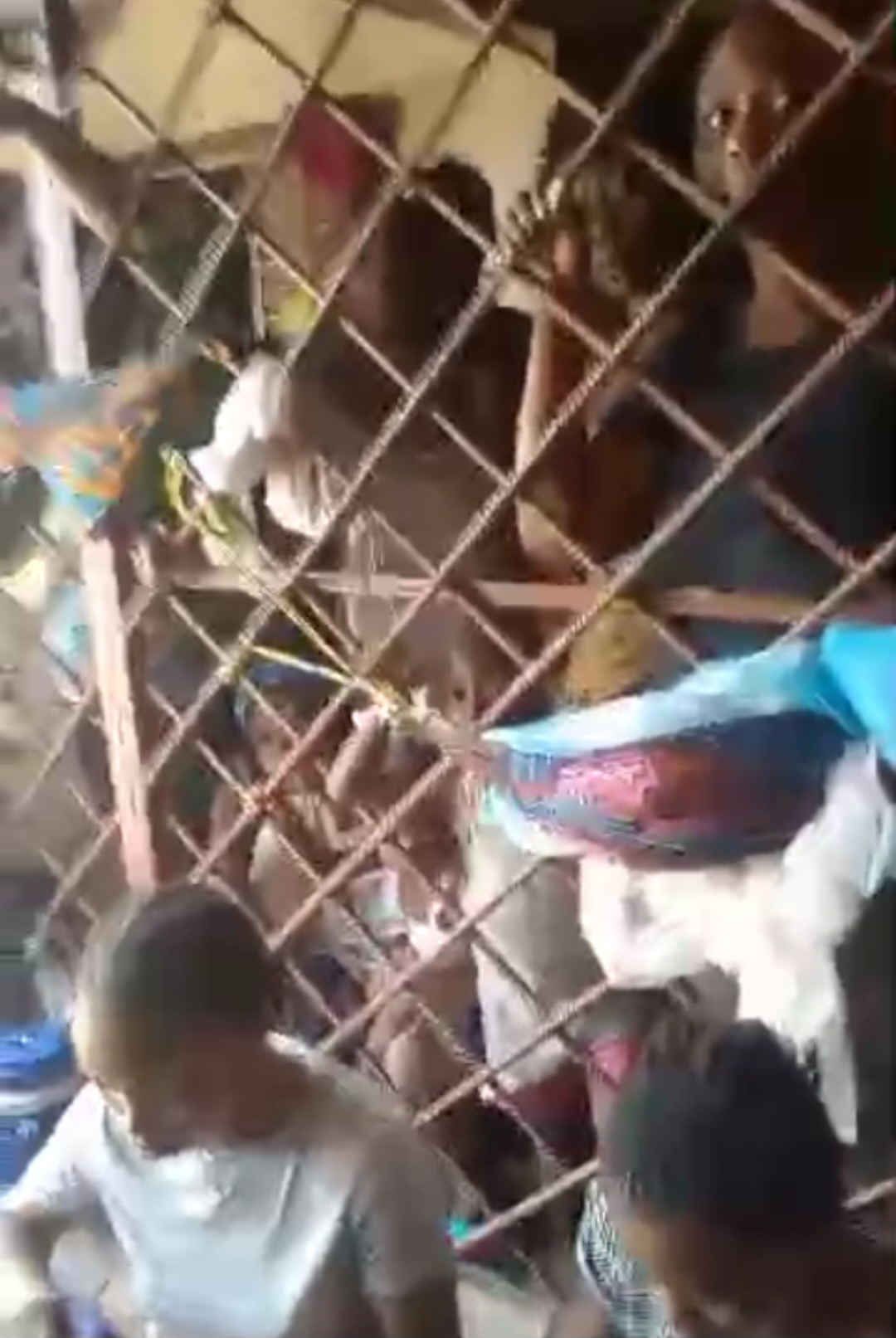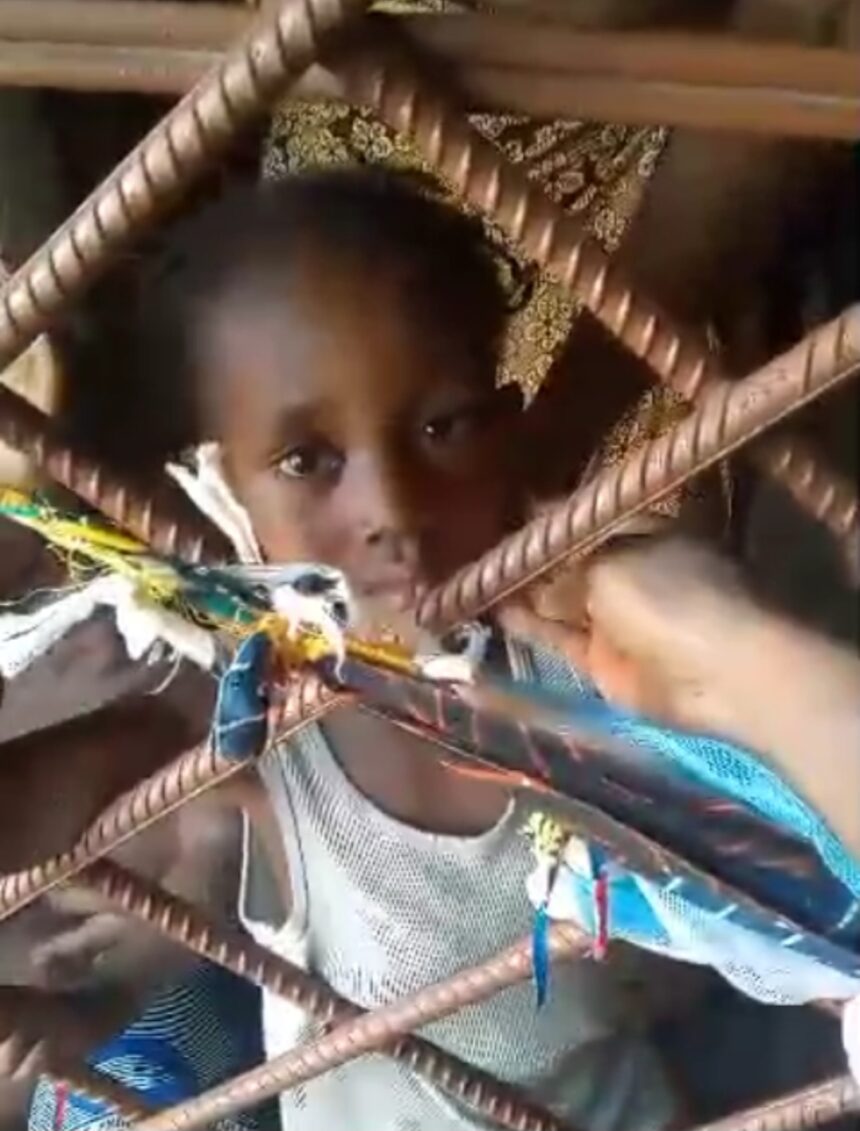•Remanded children watch in horror as prison officials brutalise their mothers
•Embassy officials accused of extorting millions from inmates
Many Nigerian ladies are languishing in Central Women Prison in Bamako, the capital of Mali. A good number of them have been in the dingy prison where they are daily dehumanised for years without trial. Some of them alleged that the Nigerian Embassy officials in the French speaking country have been fleecing them and their relations in millions with promise to secure their release. To worsen matters, innocent children co-detained with their mothers are daily traumatised watching prison authorities brutalise their mothers, INNOCENT DURU reports.
Precious, a petty trader, left the shores of Nigeria for Mali in 2020 to seek greener pastures after many years of toiling without meaningful result.
She embarked on the journey after a close friend assured her that her life would be transformed in the French speaking country even if she had to do the same petty business she was doing in Nigeria. …CONTINUE READING
“Wow!” Precious exclaimed as the information tickled and enchanted her. That obviously was the good news she had been yearning for.
Without wasting time, she packed her luggage and gave her parents and siblings emotional hugs as she bade them bye with an assurance that she would soon put smiles on their faces.
Precious’s elation however turned into despondency soon after she arrived in Mali as she was picked up by security operatives and thrown into prison.
“I have been here for more than four years without trial. They didn’t even tell me the number of years I will be staying here, not to talk of telling me when to go. I never did anything wrong,” the embattled lady said in a video sent to our correspondent by her younger sister, Sharon.
Reliving her predicament and those of other inmates in the prison, Precious said: “Some of our sisters have become paralysed. Many others have given birth here while some others came in with their children.
“Imagine one of our sisters gave birth at a police station and she was brought in here with the newborn baby and blood on her body.”
The infant might have had irreparable damage done to her psyche as Precious said: “The baby has spent three years here in the prison. Now if she sees a vehicle, she will run, if she sees a male person, she will run. She runs away from everything she sees.
“Unfortunately, there is no school the child can attend here. What will she become when she grows up?”
The children, as seen in the video, look visibly ruffled and pale as they hold on to the iron bars of the prison struggling fruitlessly to see what was happening outside.
From the narration of the inmates, the prison is the only home the children have seen in their life and the horrible experience the only education they have had. Hunger and deprivation are all they have enjoyed, leaving one to wonder what the future holds for the hapless and harmless young inmates.
Pained by their predicament, Precious blamed the officials of the Nigerian Embassy in Mali for their woes. Complaints about how some Nigerian envoys sell out their compatriots in foreign lands have become a recurring decimal. From Germany to China and from Mali to other parts of the world, our correspondent, who has been relating with the migrants, reports that the complaints have always been the same. They latch onto the problems of the citizens they are supposed to protect in order to curry favour from their hosts and consequently feather their nests.
Like other distressed migrants that our correspondent had encountered previously, Precious and her colleagues also shared their horrible experience with the Nigerian officials in Mali.
She said: “Our embassy here is our number one problem. They placed us in these people’s hands and they are still the ones coming round to ask us for money to secure our release.
“When you give them that money, they will use it and would not do anything about the problem.
“I have spent more than four years in this prison. They ate my money.
“When anyone among us goes to court, they will still be the ones that would go and stand against the person. They will tell the court not to release us.
“There are mothers among us who have been sentenced to 10 years imprisonment.
“If I spend 10 years in prison, how many years do I have left to be productive?”
She alleged that some of the officials “collected N9 million from some of our sisters. If I am lying, send this video to them. Let them come and ask me. We have more evidence.
“We have 18 of our brothers and sisters (eight boys and 10 girls) who were selling supplements in Burkina Fasso. They came here to hustle at ages between 19 and 20.
“Their only offence was that they did not have approval to sell the supplements. They were rounded up and brought to the prison.
“Those children don’t know how they can even get food to eat. The embassy that was supposed to stand for them were the ones who went to tell the authorities that those children were into human trafficking whereas they have the ID cards of their companies and the supplements they were selling.
“The authorities arrested them and the supplements and took them to a police station. From the police station, they took them to court and wrote that they were into human trafficking.”
Continuing, she said: “The company went to the embassy in Nigeria to complain and from there, they called the embassy here to release them. But they said the money for bail will not be enough and demanded that the parents of the children should send them N10 million or they will be sent to five years in prison.
“The prison officials beat us every day. We have sent letters to our embassy on many occasions but they have always replied that they should not be involved in our matters. They said we should be left here to rot away. We are calling for help from Nigerians.
Frustrated by her experience in the Malian prison, Precious pleaded to be brought back home to serve her prison terms.
Her words: “If it means going to serve jail term in Nigeria, I am okay with that. We are here at our own risk. It was not a small issue with the prison authorities this morning.”
Seeking the intervention of the Federal Government and kind hearted Nigerians, Precious said: “This video is the only avenue we have to speak out. Please help to make it go viral and reach the top government officials in Abuja.
“We believe that no matter how bad Nigeria is, the President will not just sit and watch us die. I am begging Nigerians in the name of God to help us.”
Contrary to claims in some quarters that the video in which Precious spoke was an old one, our correspondent searched and reached out to Precious’s sister Sharon, who promptly dismissed the claims and went on to share fresh videos and audio messages from her sister with our correspondent.
Precious directly responded to our request in one of the short voice messages.
Seeking help for Precious, Sharon went down memory lane to recall how she embarked on the ill-fated trip.
She said: “My sister travelled to Mali between 2020 and 2021. She was into petty business before someone told her about Mali.
“The person told her that there was money in Mali. They arrested her immediately she got to Mali and seized her phone.
“It was two years after she had been in prison that she told us that she was in detention. She used the mobile number of a prison cleaner.
“The amount of money the people over there are demanding from them is too much. They asked for N1million.
“The Nigerian embassy is not helping matters. My sister and other inmates are asking to be deported but they are not cooperating.
“They are also not taking them to court; they just kept them there.”
As a family, Sharon said, “we don’t know what to do again. Our parents are aware of her condition. We have no money. They are asking for a million naira and we don’t have such.
“My mum is not working. My brother has been sacked in his place of work. We have nowhere to raise such money from.
“It is not easy for us to survive here in our own country. The only thing we can do is to cry out to all Nigerians just as we are doing now.”
‘How Nigerian embassy officials collected N3,8 million without securing my release’
Another inmate told of how officials of the Nigerian embassy in Mali deceitfully collected millions of naira to secure her release but later abandoned her.
She said: “We are more than 100 here. The name of the prison is Bolefam, Bamako.
“The Nigerian Embassy here is the one killing us. They collected N3.8 million from me with assurance that I would come out of prison, but all that is to no avail.
“I have spent three years and three months here without going to court. We have fasted for a month for us to get released. We even did dry fasting but nothing came out of it. At a point, we were asking if God really exists.
“But we will not give up. We will keep praying.”

Inmate’s mother dies of shock
Besides the traumatic effects of imprisonment without trial on the inmates, the effects are also hitting very hard on their people back at home.
Narrating her ordeal, one of the inmates said amid sobs: “I have been in this prison for many years without any help. When I called my mother to inform her that I am in prison, my mother died out of shock.”
Since the mother’s demise, she said, “I don’t have anybody to help me. We really need help. I am begging.
“If we don’t get help, we will die at the hands of these people. The prison conditions are not easy at all.”
Also decrying her predicament, another inmate said her parents had gone broke trying to secure her release.
The fair complexioned lady said: “My parents have spent so much money to secure my release to the point that they have given up hope about my freedom.
“If they give me a 10 years jail term, will it not be over for me? To feed in this place is a big problem.”
Many of the inmates have various degrees of injuries inflicted on them by the prison authorities. They risk tetanus infection as they have been without treatment. “I can’t even get treated for the injury that they inflicted on me. Please help us before they kill us here.
“We don’t want to die here. Please help us. Let them take us to our prisons in Nigeria to serve our sentences.
“My brothers and sisters, please help us. Look at me being in prison at this early stage of my life.
“If they give me a jail term of 10 or five years, what will become of me when I come out?”
Distressed by what she had gone through, an inmate said: “Being in prison is not an easy thing. It is only those who have served prison terms that can understand what it takes to be in prison. Please we are begging for your assistance.”
Confident that the Nigerian authorities have all it takes to secure their release, she said: “If the Nigerian embassy asks them to release us today, they will do so.
“When we met the director of the prison, he said the ball is in the court of our embassy. When we met the judge, he said our hope lies in our embassy.
“The Nigerian embassy is the problem we have today. If they order for our release, we would be set free.”
Also speaking, another injured lady said: “This injury you are seeing was sustained yesterday, September 26, 2024. We had earlier posted a video asking for help.”
According to her, the prison authorities resorted to battering them after a video they did surfaced online.
“The guidance in the prison saw the video and asked for the phone that we used to record. We refused to release the phone because that is what we are using to reach out to people back at home to ask for help.
“When we refused to release the video, they started beating us. Look at the injuries.”
She added: “We are more than 14 that had various degrees of injuries inflicted on us. We are suffering here and we don’t know what will happen tomorrow, because they have vowed to kill us.
“They said even if they kill us, our President cannot do anything. That is the worst part of the whole thing.
“They said we should go back to our country. Ironically, when we asked to be deported, they said no and that even our president cannot do anything about it.
“Please, we are asking for help. We cannot do it alone.
Also decrying the roles of the Nigerian officials in Mali, she said: “The people that call themselves workers at the Nigerian Embassy are not doing their job. They are the ones selling us out to these people.
“The director of this prison went to our embassy today to complain about the beating. But do you know their response? They said that they should kill us because they don’t have anything to do with us.
“Please don’t allow anything to happen to us in this country, because we don’t have a father, mother, brother or sister here. We are here alone.
“Upon all the money that we wasted, they have refused to give us food since morning. We are starving here.
“When we went to where we could get bread to buy, they refused to sell to us.
“Please, before things get out of hand, come to our rescue.”
Experts on dangers of incarcerating mothers with children
Experts and various reports sourced by our correspondent frowned at the practice of detaining children with their mothers, albeit, some gave a few reasons why it may be of advantage.
Writing on the topic ‘Mothers and babies in prison’, Parliamentary Assembly of the Council of Europe said: “Prison is not a healthy environment for babies and young children. The mother is inevitably under stress, prisons tend to be noisy and privacy is difficult.
“Stimulation is severely restricted. Many prisons holding babies and young children have few specially trained staff, poor play and exercise facilities, and the development of movement skills is restricted.
“Many mothers in prisons in Europe have little or in some cases no right to go outside the prison walls with their babies, and consequently the babies never see trees, traffic, animals or experience ordinary family life.
“The children have little opportunity to bond or form relationships with other family members, particularly their father and brothers and sisters. Food is often restricted to tins or prepared baby foods.
“A longitudinal psychological study of babies in prisons with their mothers (Catan 1988) found a gradual decline in their development of movement and cognitive skills. It was assumed that this was because the prison environment restricts exercise and exploration.
“Once babies start to sit up, crawl and walk, there are few opportunities for prison babies to explore. Instead, they spend more time confined to baby walkers, bouncers and pushchairs.
“The study found a significant increase in the babies’ general development after the mothers’ release.”
Also examining the effects of keeping children in prison with their mothers, African Human Rights Law Journal said a research conducted on this controversial topic attempts to substantiate the advantages and disadvantages of both sides.
It said: “Despite inaccurate data, it is estimated that as at 2017, approximately 19,000 children were living in prison with their primary caregivers, usually the mother.
“Proponents of co-detention argue that it may afford infants and young children an opportunity to bond and develop a secure attachment with their mother, an ‘inseparable biological and social unit’, with undeniable (short and long-term) consequences for the child’s psychological, social and educational development.
“Being breastfed is beneficial to the child by significantly reducing morbidity and mortality rates in the first two years of life.”
This temporary arrangement, it said, could provide a higher level of mental stability for both mother and child and could prevent child abandonment. However, it noted that the mother’s familiar and nurturing presence may be the only reassuring element in the midst of a hostile environment such as the prison.
“Carefully considering the myriad of difficulties associated with prison life and in order to preserve the best interests of the child, supporters of co-detention rather recommend the creation of special institutions where the impact of co-detention on the holistic development of the child could be mitigated.
“On the other hand, it has been argued that children should never be punished for their parents’ crimes and that, therefore, they should not be deprived of their right to liberty, especially if the conditions of detention are not in favour of such choice.
“Co-detention leads to multifaceted violations of children’s rights and may expose them to various risks, depending on the level of prison development and the duration of the stay.
“Most contemporary African prisons find themselves ‘at odds with human rights standards’, being under-resourced, understaffed and overcrowded, evidently translating into overall precarious conditions of detention. “Therefore, such institutions are ill-equipped or completely unable to provide for the specific needs of children.
“Truth be told, most African prisons do not even provide special accommodation for children in co-detention, with the exception of pioneering South Africa as well as certain prison facilities in Ethiopia, Ghana, Kenya and Uganda, where since 2014 mother and baby units have been created.
“The majority of African prisons do not provide for the basic necessities of infants and young children such as formula, bottles, clothing and hygiene products.”
NAPTIP, Malian Embassy decline comment
Our correspondents’ efforts to get the reactions of the National Agency for the Prohibition of Trafficking in Persons (NAPTIP) and the Malian Embassy in Nigeria to react to the allegations were unsuccessful.
NAPTIP’s spokesman, Zack, failed to answer calls to his mobile lines and also refused to respond to messages sent to him via regular text and WhatsAPP. The Foreign Affairs spokesman also declined comment.
The Malian Embassy also did not respond to our message sent via email.
Decrying the conditions of the girls and government officials’ attitude to their plight, Osita Osemene, the Executive Director, Patriotic Citizens Initiative and National Secretary and Head of Programmes, Network Against Child Trafficking, Abuse and Labour, NACTAL, said: “I got this report of Nigerian girls in prison through one of the relatives of the girls who are in prison. It was very touching. I started making contacts after watching the videos especially when I realised that the videos are recent. I was pained because one of the fundamental responsibilities of humanity is to protect the rights of citizens.
“I didn’t probe to know what was wrong but after listening to their voice notes, I noticed that most of them are girls that went for greener pastures or those who were trafficked and being used for sexual exploitation.
“I shared the videos to government officials; NAPTIP, NIDCOM, National Commission for Refugees, our regional platform, West Africa Coalition against Trafficking in Persons, and other stakeholders for intervention because this case does require urgent intervention. We started reaching out through our network, NACTAL, to see how interventions can be done. I even went to the international Centre for Migration and Policy Development. The project manager on counter trafficking had to put a call across to Mali with some of their project contacts there to get across to the Malian government.”
After reaching out to government officials in Nigeria, Osita said: “The feedback I got is that I should find out further what the people did that made them to be kept in prison. I found it difficult why I should be finding out what the people actually did. We are supposed to move in and save the situation first. The girl that sent that video to me has been brutalised and taken to another prison. Eyewitnesses said that she was really wounded and they confiscated the phone that she used in doing the recording. They weren’t happy that the video went viral.
“We have an embassy there that should have shown more concern about the plight of the citizens. They are not bothered about the situation of the citizens in Mali and that is very unfair. We in civil society are not happy the way Nigerians are being treated and the way the authorities are handling issues. They are putting the lives of Nigerians in danger.
“ No matter what, they should protect the citizens. It will be unfair if Nigeria does not care about its citizens who are languishing in prison abroad. Incidentally, these are women and children. It will be unfair if we don’t probe into the matter and see how these people can be rescued and brought back.
What did they do that warranted packing such a large number of girls in prison?”

Foreign Affairs Ministry, NIDCOM reacts
Contacted, the spokesperson for the Ministry of Foreign Affairs, Amb. Abu-Obe Eche, replying via a text message, said: “I will confirm from our mission in Mali; but I suspect it is bogus. Diplomats don’t take advantage of inmates.”
Amb. Eche was yet to get back to the reporter on his findings from Nigeria’s mission in Mali as at the time of filing this report.
When the reporter also approached the Nigerians in Diaspora Commission (NIDCOM) for comment, the Director of Media, Public Relations and Protocols, Abdur-Rahman Balogun, responded by sharing a statement issued by the commission on the ugly development.
The statement titled ‘RE:VIDEOS ON STRANDED NIGERIANS ABROAD ON SOCIAL MEDIA-LET’S BE CAUTIOUS’ reads: “In recent times, there have been series of viral videos both old and new ones circulating on social media on Nigerians stranded in various countries or in detention camps owing to many reasons from irregular migration, violation of consular regulations or outright committing one crime or the other and requesting for urgent help of the Federal government for evacuation and transportation back home.
“Another one is that of mainly girls, in Bamako, Mali prisons, in a very dehumanising conditions and calling for help from the Federal government of Nigeria.Just like the case of Libya and other cases , the Nigerian government has severally evacuated thousands of Nigerians stranded in Mali, with a warning to avoid any temptation to be lured there. But they still return.
“The Office of the National Security Adviser (NSA) is heading the Multi-Agency Task Force, which includes Nigerians in Diaspora Commission, (NIDCOM), National Emergency Management Agency (NEMA), National Commission for Refugees, Migrants, and Internally Displaced Persons (NCRMIDP), Nigeria Immigration Service,(NIS), among others.
“We urge Nigerians to be cautious in circulating such videos (mainly undated ) and note that the multi-agency team headed by the National Security Adviser, has been evacuating stranded Nigerians abroad , including those being sent back for various offences.
“While we note that the Federal Government is working round the clock to see to the welfare of its citizens wherever they may be in line with its citizens’ diplomacy, we reiterate again that irregular migration and criminal activities must be avoided as the penalties are severe and deadly.”



